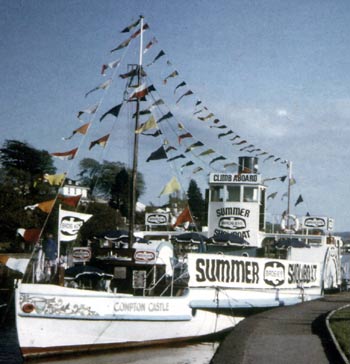
The Kingsbridge Information Centre kindly pointed me to Kingsbridge's Cookworthy Museum, where I thank Tim Noyce and Margaret Lorenz for their help.

Tim Noyce remembers “I can remember Compton Castle quite clearly. The food on board was fantastic. Harry’s wife did all the cooking and it was very good.
I was particularly interested in her steam engine, as I was restoring a 1923 steam road roller at the time. Mine was a Clayton and Shuttleworth steam road roller. They were a relatively small East Anglian company.
My father and grandfather built the Regal Cinema in Kingsbridge and I ran it when my dad died. I was 21. I ran the cinema for 10 years until TV smothered it. We closed it in 1973.
Most of the regular comings and goings of paddle steamers finished in the mid-thirties and from that came a growth in pleasure boats giving rise to a considerable increase in the number of small boats moored in the estuary. It was inevitable when filming that 'Birds Eye' advert the Compton Castle would get tangled up with some of them during her short passage much to the consternation of boat owners. As far as the guy making the film was concerned it was impractical to be filming on the move. He wanted a backdrop and that backdrop kept. Even if you've only got a moderate amount of crosswind, there is so much windage on a paddle steamer because of the superstructure above the water, it’s going to get blown side wards. And you can’t control it because you’ve got no motion. This all took place a few hundred yards downstream towards Tacket Wood.
Of course by the Sixties pleasure boating had grown and the harbour authority allowed all this recreational boating to compensate for the lost revenue. There was no control on the harbour at this end and people were dropping moorings wherever they liked. This meant there was no fairway for anything of any size. You know how narrow the head of the estuary is, so manoeuvring anything up, let alone a paddle steamer was not easy. It was, I gather, quite an interesting experience for all who were there. It was a good source of assorted stories and laughter in the local pub.”